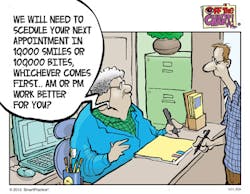Reader's Forum
To submit letters to the editor, send to: RDH, P.O. Box 3408, Tulsa, OK 74101; [email protected]; or (918) 831-9804 (fax)
Dear RDH:
In her recent letter, Ms. Slim ignored key components of my September 2012 criticisms of her earlier article that highlighted a seriously flawed American Heart Association Statement, developed in a loose collaboration with the American Dental Association. I'll review my criticisms briefly:
- In the abstract of the AHA statement, the authors referenced an opinion that abuse of the perio-systemic theme is common. Yet, they failed to elaborate or discuss evidence to that effect in the statement itself. The editor of Circulation should have nixed this.
- To compound the bias, the statement went well beyond an unfounded recommendation against periodontal interventions and instead mandated in the final sentence of the paper that — despite limited evidence and no cost-benefit analyses whatsoever — that periodontal therapeutics based on links to ASVD are somehow "unwarranted." In this context, such a mandate is absurd.
- In her rebuttal to my criticisms, Ms. Slim admits what may be her own bias, namely that she's "frankly tired of hearing the spin..." "Spin" is a pejorative that's often used to denigrate others' views without having to actually address them. It's a rhetorical device used to end discussion.
So I'll repeat what I wrote in September, namely: "Unfortunately, the AHA statement typifies what's become fashionable in some circles, namely a bias toward dismissing interventions that are not backed by high-quality evidence. But because truth exists independent of evidence, and high-quality evidence may not always be available, the AHA's mandate exhibits glaring bias toward non-intervention without any discussion or comparison of costs versus benefits. Astute RDH readers may recognize such a "no-treat-unless-sure" mindset is commonplace in the Canadian, British, French, German, and other socialized health-care systems that reduce costs by mandating that high-level supportive evidence be in place before certain treatments will be authorized. However, the AHA statement fails even in the context of cost control, insofar as the costs of improved oral hygiene are trivial compared with even minimal improvements in ASVD-related events."
As I also noted in my September 2012 letter to RDH, I share Ms. Slim's concerns about exaggerations that misuse the links to frighten dental patients. But I suggested that in light of the low costs and low risks associated with efforts to improve oral hygiene, that including the possibility of causal links in that context should continue, notwithstanding the AHA's statement's opinionated mandate to the contrary.
Ms. Slim's weariness of "spin" by perio-systemic proponents represents the "other side of the coin" in the context of opinion-based hyperbole. The truth is we don't know if there is cause and effect, but there is plenty of evidence that suggests that there may be — even the AHA statement acknowledges this fact. So, until we know for sure, IMHO RDHs should be encouraged to use the science that supports perio-systemic links to add to the reasons patients ought to seek better oral health, especially in efforts to achieve inexpensive and low-risk improvements in self-care.
Finally, I'd be happy to debate this with anyone in any forum. I'm not "frankly tired" of efforts to determine how incomplete science should and must be used clinically. RDH's readers ought not be "tired" either. Decision-making in a cost-benefit context using incomplete evidence is common in all aspects of life; the concept that dental hygiene or dentistry is different is intellectually sophomoric. RDH
Michael P. Rethman, DDS, MS
Honolulu, Hawaii

